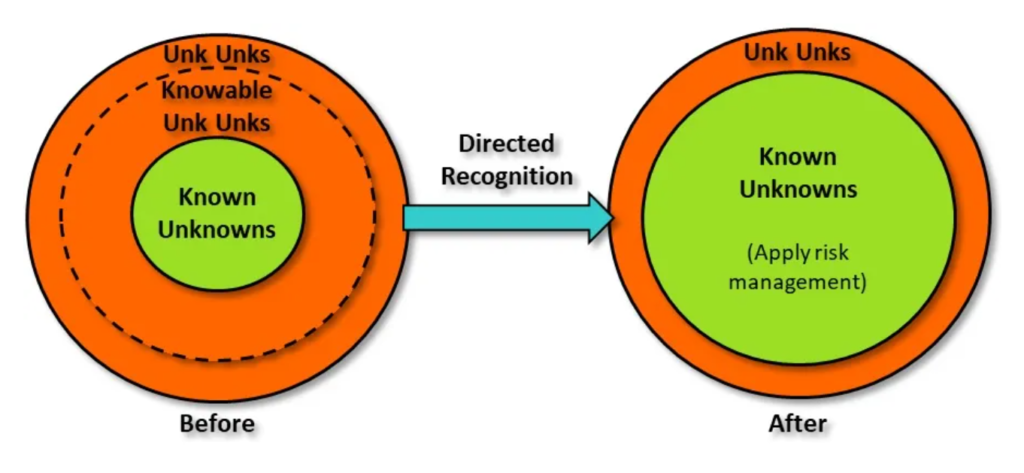In the world of project management, the term “unknown unknowns” may sound like a paradox, but it’s a concept that has a significant impact on the success of complex projects. Unknown unknowns are essentially those surprises that pop up unexpectedly and have the potential to derail even the most meticulously planned endeavors. However, it’s crucial to understand that many of these so-called unknown unknowns could have been known if project managers had known where and how to look.
Let’s delve into the world of unknown unknowns, their impact, and how project managers can shine a light into the right holes to uncover uncertainties that could affect a project’s success.
The Elusive Nature of Unknown Unknowns
Unknown unknowns often emerge as the root cause of unwelcome surprises in projects, whether it’s a space shuttle disaster, a train derailment, a terrorist attack, or cost and schedule overruns. Surprisingly, many of these unknown unknowns were not truly unknowable; they were merely hidden from the view of decision-makers. This hidden knowledge often exists within the project teams but fails to reach the top decision-makers.
In some cases, unknown unknowns result from unforeseen interactions among known elements of complex systems, such as product components, process activities, or software systems. Therefore, these surprises can stem from within the project’s ecosystem.
Uncovering the Source of Unknown Unknowns
To address unknown unknowns, it’s essential to look in the right places. In complex projects, unknown unknowns can arise from at least six complex systems:
- The desired project result: What the project aims to achieve.
- The work done to get the result: The project processes and activities.
- The people and teams: The individuals and groups executing the project.
- Resources and tools: The equipment and tools used in the project.
- Requirements and objectives: The goals and specifications of the project.
- The project’s environment: The context in which the project operates.
Each of these systems, or project subsystems, consists of a complex network of interrelated elements. It’s essential to understand how these systems interact with each other and explore their inherent complexities.
Factors That Increase the Likelihood of Unknown Unknowns
Several factors can make unknown unknowns more likely in projects:
Complexity: Complex systems with many elements and intricate relationships are more prone to unknown unknowns.
Complicatedness: This is observer-dependent and relies on the ability of project participants to understand and anticipate the project.
Dynamism: Fast-changing systems are more likely to give rise to unknown unknowns.
Equivocality: Imprecise information or poor communication can cloud judgment.
Mindlessness: Perceptive barriers, biases, and inappropriate filters hinder the recognition of unknown unknowns.
Project pathologies: Structural or behavioral issues, like unclear expectations and dysfunctional cultures, can keep unknown unknowns hidden.
Tools for Uncovering Unknown Unknowns
Addressing unknown unknowns requires the right mindset and toolset. Here are eleven types of tools to help detect unknown unknowns and convert them into known unknowns:
Decompose the project: Model the project’s subsystems to understand their structures and complexities.
Analyze scenarios: Construct different future outlooks and explore their ramifications.
Use checklists: Draw insights from past projects and codify learning.
Scrutinize plans: Independently review project work plans, schedules, resources, budgets, etc.
Long interviews: Engage in deep interviews with stakeholders to uncover lurking problems and issues.
Pick up weak signals: Recognize subtle signs that something is amiss.
Mine data: Use electronic data mining to extract implicit and potentially useful information.
Communicate frequently and effectively: Foster a culture where bad news can travel up in the organization.
Balance local autonomy and central control: Allow for emergency channels.
Incentivize discovery: Reward those who bring unknown unknowns to light.
Cultivate an alert culture: Educate about unknown unknowns and where they tend to lurk.
The Power of Due Diligence
In summary, the ability to address unknown unknowns is a critical aspect of project planning and execution. When comparing two similar projects, one with identified risks and the other without, it’s often the latter that is riskier. Ignoring uncertainties and risks can lead to delusion and deception, which plague many projects and endeavors.
By following the approaches outlined here, project managers can conduct due diligence and significantly enhance their ability to manage complex projects effectively. Unknown unknowns need not remain hidden when we have the right tools, mindset, and culture in place.
References:
Browning, T. R. and Ramasesh, R. V. (2015). Reducing Unwelcome Surprises in Project Management. MIT Sloan Management Review, 56(3), 53-62.
Ramasesh, R. V. and Browning, T. R. (2014). A Conceptual Framework for Tackling Knowable Unknown Unknowns in Project Management. Journal of Operations Management, 32(4), 190-204.
In complex projects, understanding and addressing unknown unknowns is a key to success. By employing the right tools and approaches, project managers can better prepare for surprises and ensure their projects stay on track.


Nice Content
cialis canada prices
Some genuinely wonderful work on behalf of the owner of this web site, dead great content material.
cheap cialis with dapoxetine
buy cialis fast shipping
cost of sildenafil online
how do i buy viagra online
cialis 800 black canada
cheapest tadalafil tablets
Fertomid
viagra usa buy
research tadalafil
canada pharmacy viagra
buy female viagra canada
tadalafil and nitrates
cialis omline
united pharmacy cialis
cialis 5mg price
flagyl psychosis
Everything is very open and very clear explanation of issues. was truly information. Your website is very useful. Thanks for sharing.
flagyl diarrhea
how does furosemide affect blood sugar
is lisinopril an ace inhibitor
how does zoloft make you feel at first
how much does zithromax cost without insurance
lasix bodybuilding
gabapentin seizure
glucophage kopen
cephalexin and milk
hydroxyzine and escitalopram
para que sirve gabapentin 100 mg
cat amoxicillin dosage
how much is bactrim without insurance
allergic reaction to cephalexin
ciprofloxacin 500 para que sirve
bactrim for sinusitis
cephalexin syrup dosage for child
fluoxetine vs escitalopram
can you take gabapentin while pregnant
Excellent read, I just passed this onto a friend who was doing a little research on that. And he just bought me lunch since I found it for him smile Thus let me rephrase that: Thanks for lunch! “Curiosity will conquer fear even more than bravery will.” by James Stephens.
ddavp melts dosage
citalopram and anxiety
depakote and lamictal
ddavp hypernatremia
medications depakote
diltiazem iv dose
ezetimibe simvastatin classification
diablo 4 controversy
effexor and wellbutrin
what is the medicine allopurinol used for
what do aripiprazole and lorasepam treat
cost of amitriptyline
what is augmentin
side effects of celebrex 200 mg
baclofen reviews anxiety
bupropion headache
moon juice ashwagandha
side effects of buspirone (buspar)
1800baddrug actos
goodrx semaglutide
how long does it take abilify to work
protonix lawsuit
remeron class
robaxin cost
repaglinide excretion
synthroid reduction
I’d constantly want to be update on new articles on this web site, bookmarked! .
synthroid bioequivalence
Have you ever thought about including a little bit more than just your articles? I mean, what you say is valuable and all. However just imagine if you added some great images or videos to give your posts more, “pop”! Your content is excellent but with images and videos, this blog could definitely be one of the most beneficial in its niche. Awesome blog!
tamsulosin hydroxide
venlafaxine er 37.5mg reviews
does voltaren come in a pill form
Fitspresso stands out among the crowded health supplement market as an exceptional product.
max dose of zofran pump
zyprexa seroquel
weight gain or loss with wellbutrin
how safe is zofran while pregnant
zyprexa symptoms
zetia generic 2016
I’m also writing to make you understand of the wonderful discovery my cousin’s girl obtained visiting yuor web blog. She came to find several issues, with the inclusion of what it is like to possess an incredible teaching mood to get many others without hassle grasp some complex things. You actually did more than visitors’ desires. I appreciate you for rendering those interesting, dependable, revealing and also fun tips about the topic to Emily.
Hello, Neat post. There’s an issue together with your site in internet explorer, could check thisK IE still is the marketplace chief and a huge component to other people will miss your wonderful writing because of this problem.
Its such as you read my mind! You seem to know so much about this, like you wrote the guide in it or something. I believe that you simply can do with some p.c. to force the message house a little bit, but other than that, that is magnificent blog. A great read. I will certainly be back.
I like this blog so much, saved to bookmarks. “Nostalgia isn’t what it used to be.” by Peter De Vries.